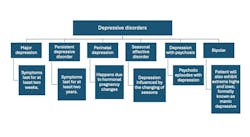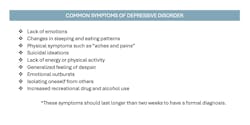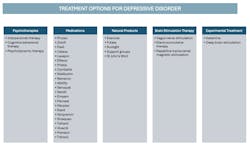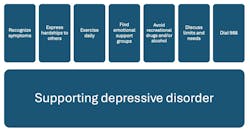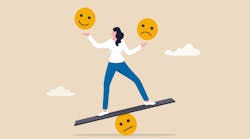Depression in dentistry: There is help for dental professionals
When people feel sad, it is often a feeling that society tries to fix by cheering them up. Typically, a person may feel sadness for a brief period, but usually the stressor causing the sad feelings will diminish and so will the sad feelings. But how does one decide if their feelings of sadness are deeper and need more than just “cheering up”?
What is depression?
Depressive disorder—or depression, as the public more commonly refers to it—is a mental health condition where the feelings of sadness that one experiences are so vast that they are almost debilitating to their personal and professional lives. Several terms—including major depression, major depressive disorder, and clinical depression—can be known as depression.
Depressive disorders also can be divided into several different types, including major depression, persistent depressive disorder, perinatal depression, seasonal affective disorder, and depression with symptoms of psychosis. Even those who are diagnosed with bipolar disorder will ultimately have depressive episodes that are unique to their mental illness (table 1).1,2
Depression does not discriminate—it can affect everyone in all walks of life. All races, social economic statuses, ages, and ethnic groups can experience some form of depressive disorder. About 21 million adults, or 8% of the population, were diagnosed with a type of depressive disorder in 2021. That same year, 5 million adolescents, or 20% of the population, were also diagnosed with a type of depressive disorder. Research shows that depression is found more commonly in women, individuals who identify as multiple races, and the LGBTQ population.1,2,3
Symptoms of depression
Depression has many symptoms (table 2), and each patient who is diagnosed with depression may exhibit different symptoms than someone else who is diagnosed with a type of depressive disorder. Research reveals that depressive disorder may be genetic, and a person is more prone to any type of depressive disorder when they have experienced an episode of extreme stress in their life. In addition, chemical changes in the brain, various medical conditions, and some medications can cause one to become depressed. Finally, abusing drugs and/or alcohol can cause a person to develop depressive disorder.1-3
Dental professionals and depression
Research shows dental professionals have a high frequency of becoming depressed. In 2021, one survey identified over half of the participants had felt depressed because of the high expectations of their profession.4 No one knows exactly why depressive disorder is seen so commonly in the dental profession, but several theories have been studied.4-8
Dental professionals tend to have perfectionist personalities, and the everyday pressures of the job tend to put them over the edge.6 Some have argued that dental professionals are more prone to depression due to their tight working schedules, and their work with demanding, anxious patients tends to make them depressed.5-7 Finally, even if science did not already recognize common features such as personality traits and workflow that make dentistry depressing, the aftermath of the COVID-19 pandemic forced depression even harder upon dental clinicians.
The University of Alabama reported that 10% of dentists and even more dental hygienists experienced feelings of depression during the COVID-19 pandemic between the years of 2021 and 2022.8 We still don’t know how many dental professionals are facing depression due to the ongoing dental staff shortage. But no matter the reason, the bigger reality is recognizing that dental professionals often face depressive disorders.
Treatment for depressive disorders
If a dental professional believes that they are experiencing any of the symptoms of depressive disorder, they need not feel ashamed. Their professional expertise will not be harmed if they recognize and treat their depression. The first step is admitting that they are experiencing depressive disorder symptoms for longer than two weeks. After the admittance, the dental professional should make an appointment to speak with their medical doctor. The medical doctor will help to diagnose depression and specify which type of depressive disorder they are experiencing. Getting diagnosed is crucial to receiving the best type of treatment.
Like the symptoms of depressive disorder, treatment can be unique to each patient (table 3). Science has told us that there is no direct answer to know how each depressed patient will respond to their treatment. Some of the treatment modalities are intertwined with others. Sometimes, a different depressive disorder treatment is applied if a doctor, therapist, or patient feels that their current treatment is unsuccessful. When depression of any form is treated, it can be managed and possibly cured.1,2,9,10
Perhaps you know someone who may be experiencing symptoms of depressive disorder, or you work in dentistry and have noticed you’ve recently stopped feeling like yourself. Maybe this article will highlight some important realities about depressive disorder. Even if you do not work in the dental field, maybe you are concerned about someone else who is not ready to recognize that they could be dealing with a type of depression. Please know that you are not alone; there are multiple ways to get support as you begin your journey with depressive disorder. This additional support is not a diagnosis or treatment for depressive disorder, but rather, valuable resources to help anyone who is not sure where to begin. There is no shame in accepting support (table 4).2,9,10
In the future, the stigma about receiving treatment for any form of mental illness needs to be diminished. Dental professionals are human beings who will go through periods of stress even with the best support, and they need to recognize that it’s OK to ask for help if they are beginning to show signs of any depressive disorder. Further research could be done to find out how many dental professionals are becoming depressed due to the workplace shortage. In addition, supplementary research is needed to determine why dental professionals are more prone to depressive disorders than other medical professionals. By exploring these topics, we may be able to help those who are afraid to seek medical advice for depression or who have yet to recognize the symptoms of their depressive disorder.
Editor’s note: This article first appeared in Clinical Insights newsletter, a publication of the Endeavor Business Media Dental Group. Read more articles and subscribe.
References
- National Institute of Mental Health. Reviewed March 2024. https://www.nimh.nih.gov/health/topics/depression
- National Association of Mental Illness. Reviewed August 2017. https://www.nami.org/about-mental-illness/mental-health-conditions/depression/?tab=overview
- Major depression. National Institute of Mental Health. Updated July 2023. https://www.nimh.nih.gov/health/statistics/major-depression
- Dealing with depression. American Dental Association. https://www.ada.org/resources/practice/wellness/dealing-with-depression
- Turcotte C, Sanders MJ. Strategies for managing stress. Dimensions of Dental Hygiene. November 17, 2014. https://dimensionsofdentalhygiene.com/article/strategies-for-managing-stress/
- Handzel S. Depression among dentists, a silent epidemic. Dental Products Report. October 10, 2016. https://www.dentalproductsreport.com/view/depression-among-dentists-a-silent-epidemic
- Rhoades L. The Dental Mental Network: unveiling the struggle behind our smiles. DentistryIQ. July 21, 2020. https://www.dentistryiq.com/dentistry/article/14180102/the-dental-mental-network-dealing-with-mental-health-in-the-dental-profession
- Jones A. Study shows pandemic increased depression and anxiety in dental health care workers. University of Alabama at Birmingham News. July 28, 2022. https://www.uab.edu/news/research/item/12999-study-shows-pandemic-increased-depression-and-anxiety-in-dental-health-care-workers
- Leonard J. 16 strategies and treatments to fight depression. November 16, 2019. https://www.medicalnewstoday.com/articles/327018
- Johnson E. Living with depression: how to keep working. National Association of Mental Illness. April 7, 2017. https://www.nami.org/chronic-illnesses-and-depression/living-with-depression-how-to-keep-working/
About the Author
Tracee S. Dahm, MS, BSDH, RDH
Tracee S. Dahm, MS, BSDH, RDH, is an adjunct clinical instructor for the North Idaho College School of Dental Hygiene in Coeur d’Alene, Idaho, and she also works in private practice. She has been published in several dental journals, magazines, webinars, and textbooks. Tracee is a key opinion leader on cutting-edge innovations in the hygiene field. Her research interests include trends in dental hygiene, improving access to dental care for the underserved, and mental health. Contact her at [email protected].

